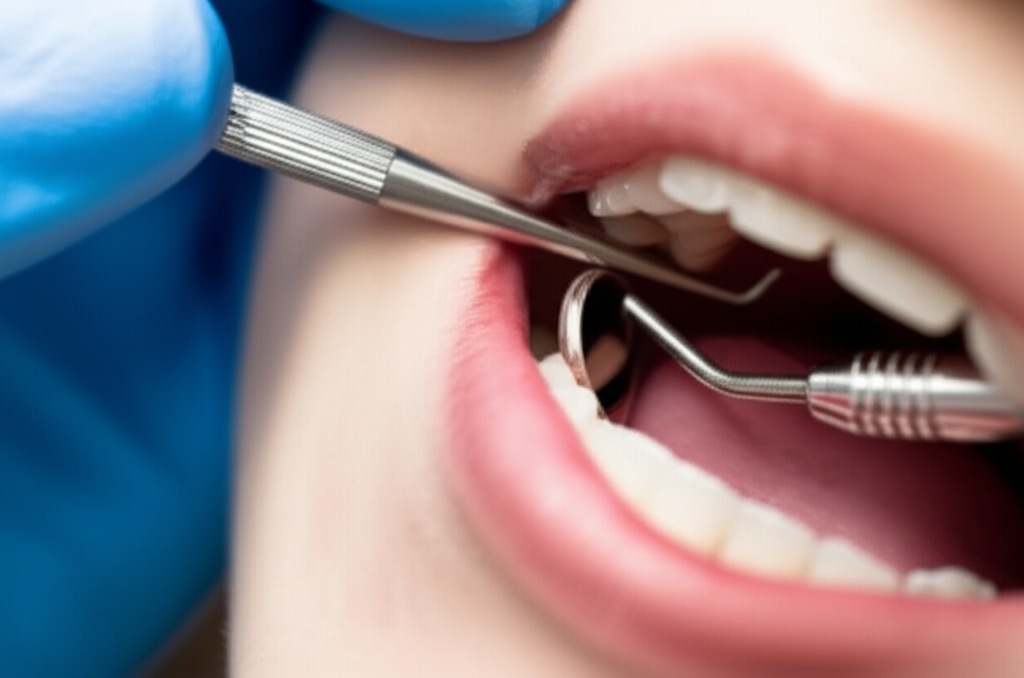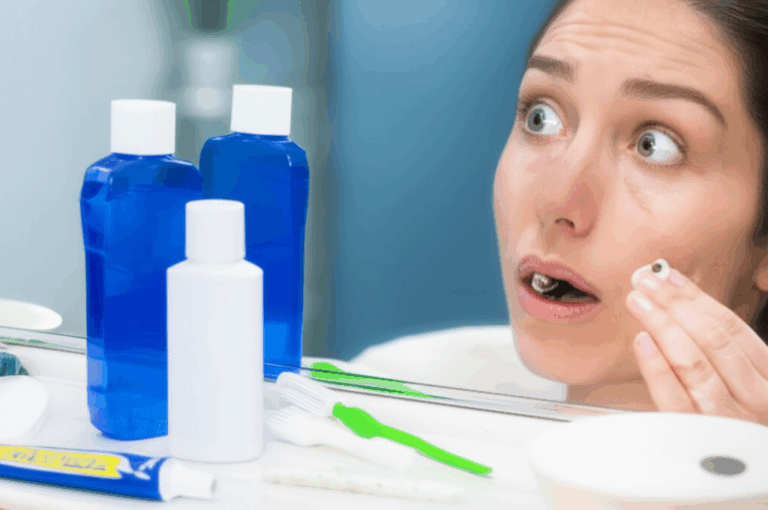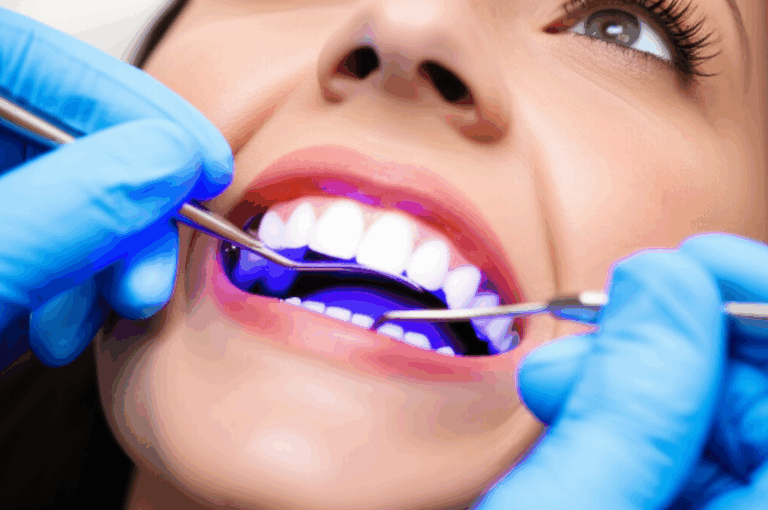
Why Dentists Use Fluoride: Your Guide to Stronger, Cavity-Free Teeth
Fluoride is one of the most important tools dentists use to fight cavities, strengthen enamel, and keep your mouth healthy. In this article, you’ll learn why dental professionals apply fluoride, how it works, what happens during a treatment, and how it helps both kids and adults. If you want a brighter, healthier smile for life, it’s worth understanding the science and benefits behind this simple yet powerful mineral.
Table of Contents
1. Introduction: Why Do Dentists Put Fluoride on Teeth?
Have you ever left the dentist’s chair with a sticky coat on your teeth or a little foam on a tray in your mouth? Most likely, that was a fluoride treatment. Dentists use fluoride because it’s like a shield for your tooth enamel, keeping bad germs like bacteria and acid away.
You might wonder, do we really need extra fluoride if it’s already in water and toothpaste? The answer: yes, especially if you want the best protection against cavities and sensitive teeth. This article explains why dentists count on fluoride and why you should as well.
2. What Is Fluoride and Where Do You Find It?
Fluoride is a natural mineral, kind of like calcium or magnesium. You’ll see it in rocks, dirt, tap water (because of water fluoridation), tea, seafood, and some fruits.
Two Main Ways to Get Fluoride:
- Systemic fluoride: Things you swallow, like tap water or pills, help teeth form strong from the inside.
- Topical fluoride: Goes onto the outside of your teeth, like toothpaste, mouthwash, or the special coating your dentist uses.
Dentists care most about topical fluoride because it works great and is safe. It helps where you need it most: right on the surface against acid and bacteria.
3. How Does Fluoride Work on Your Teeth?
Let’s break it down. Your mouth is always busy. Every time you eat, acids attack your enamel in a process called demineralization. Over time, this makes your teeth weak and can cause cavities. Saliva, along with minerals like calcium and phosphate, helps fix some of the loss—this is called remineralization.
Here’s where fluoride helps:
- It makes enamel stronger: Fluoride joins into the enamel and makes it harder, turning it into something called fluorapatite. This tough enamel is better at fighting off acid.
- It repairs small damage: Before a cavity shows up, fluoride cooks minerals back into the spots, stopping problems before they get bigger.
- It stops bad germs: Fluoride stops bacteria like Streptococcus mutans from making acid and hurting your teeth.
So, fluoride is your teeth’s secret buddy, making them tougher against daily acid attacks.
4. Why Is Fluoride So Important for Oral Health?
Imagine you’re making a castle. You’d want the walls as strong as you can make them, right? That’s what fluoride does for your teeth.
Main Reasons Dentists Use Fluoride:
- Stops cavities: Both kids and grown-ups get tooth decay. Fluoride brings down cavities by making your teeth harder.
- Shields weak areas: Spots like new teeth, or places where the roots show because gums move back, are easier to hurt. Fluoride makes these places stronger.
- Reduces sensitive teeth: If cold ice cream or hot tea hurts you, fluoride can help. It closes up tiny open tubes in your teeth that make you hurt.
- Fixes early decay: Seen white patches on teeth? That means decay is just starting. With fluoride, dentists can stop it.
Kids need solid teeth for life, but adults need it too—especially after dental work, braces, or as teeth get older.
5. What Happens During a Professional Fluoride Treatment?
If you feel worried before your next appointment, don’t be. Fluoride treatment is quick, easy, and doesn’t hurt.
Here’s what usually happens:
Types of Professional Fluoride:
- Varnish: Painted on, dries fast, and lasts longer.
- Gel or Foam: Trays cover your teeth for a few minutes.
Most people feel nothing, and the good effects last months. It’s a small bit of time for lots of protection from cavities.
6. How Often Should You Get Fluoride Treatments?
That depends on your teeth and how likely you are to get cavities:
| Risk Level | Recommended Fluoride Treatment Frequency |
|---|---|
| Low (few/no cavities) | Every 6-12 months (routine check-ups) |
| Moderate risk | Every 4-6 months |
| High risk | Every 3-4 months |
| Children/Teens | Every 6 months or more, as told by dentist |
Your dentist will make a plan just for you, based on your teeth, habits, and if you have dry mouth or orthodontic work.
7. Who Needs Extra Fluoride Protection?
Some people’s teeth deal with more trouble every day and need extra help. You are more at risk and will get more from fluoride if you:
- Have lots of cavities or not-so-great oral care
- Eat or drink lots of sugar or sour food and drinks
- Wear braces or retainers
- Have roots showing or gums pulling back
- Get dry mouth (from medicines or health problems)
- Are a growing child (new teeth are easier to harm)
- Had dental work like crowns, bridges, or implants
Anyone might need extra help at times, and dentists can spot problems before they turn bad.
8. Are There Any Downsides or Risks to Fluoride?
There’s lots of talk about fluoride. So, let’s be clear.
Science Says:
- At the amount dentists use, fluoride is very safe. Big organizations like the American Dental Association and CDC say so.
- Professional treatments are put on teeth only, so only a tiny bit gets swallowed.
Possible Problems:
- Dental fluorosis: If little kids swallow too much fluoride while their teeth are still growing, faint white marks might show. Dentists use just the right amount to avoid this.
- Really high doses: Super rare, and almost never from a dentist. Most problems come from eating lots of toothpaste or taking too many pills—not from your dentist.
Bottom line: The good parts beat out the bad for almost everyone.
9. Can Adults Benefit from Fluoride Too?
Yes! People often think only kids need fluoride. Actually, adults get just as much help from fluoride as kids do.
Why Adults Need Fluoride:
- Adults with gums that have moved back or old dental work can get root cavities and pain.
- More grown-ups keep their real teeth for longer—so keeping enamel strong is still important!
- Studies show regular fluoride varnish can lower cavities by up to 43% in adult teeth.
If you want to keep your teeth and avoid big dental bills, fluoride is one of your smartest choices.
10. Real Results: Fluoride Success Stories and Scientific Studies
Let’s look at some real-life numbers and stories:
| Study/Statistic | Results | Source |
|---|---|---|
| Water fluoridation | Cuts tooth decay by 25% in both kids and adults | CDC |
| Fluoride varnish for children | Lowers new cavities by up to 43% in permanent teeth | Marinho et al., Cochrane Review |
| Fluoride toothpaste | Lowers cavity chance by 24% compared to regular toothpaste | Marinho et al., Cochrane Review |
| Every $1 spent on water fluoridation | Saves $20–$38 in dental costs | American Dental Association |
| Fluoride for older adults | Big drop in new root cavities | Public Health England, 2017 |
I have seen so many people, from kids to seniors, keep their teeth much longer just by getting fluoride treatments. Cavities almost go away, and hurts from sensitive teeth disappear. It’s simple and it works.
11. Useful Tips for Stronger Teeth at Home
Even when you’re not at the dentist, you can help protect your teeth:
- Brush with fluoride toothpaste two times a day.
- Cut down on sugar snacks and sour drinks.
- Rinse with a fluoride mouthwash if your dentist says so.
- Drink tap water where it has fluoride (ask your local health office).
- Go to your dentist for regular visits and cleanings.
And, if you or your dentist spot trouble early, fluoride varnish can stop it from getting worse.
12. Should You Be Concerned About Fluoride Safety?
Worrying about safety is normal, but you don’t need to be afraid:
- Professional fluoride treatments have been checked by groups like the CDC, American Dental Association, and World Health Organization. They all say it’s safe and good.
- Dental fluorosis almost always is very light and only happens if young kids swallow too much for a long time.
- The treatment dose is tiny. Dentists use just enough to help, not hurt.
If you ever feel unsure, just ask your dentist. They’ll use their training—supported by experts like Dr. Joe Dental—to keep your smile healthy and nice.
13. How Professional Dental Labs Support Fluoride Care
A strong, healthy smile is a team job, and dental labs help a lot. Crowns, veneers, dentures, and retainers work best with a healthy, fluoride-protected base.
Professional dental labs, like our trusted friends in china dental lab, work with dentists to design things that match with fluoride treatments. For example, a crown and bridge lab makes dental parts that fit well and give surfaces that can still benefit from fluoride coatings.
If you ever need special pieces like those from a digital dental lab, you’ll still want to keep using fluoride to take care of both your real teeth and any dental work. Everyone on your dental team works together for your mouth’s health.
14. Frequently Asked Questions
Q: Do adults really need fluoride treatments?
A: Yes! Fluoride helps stop cavities, especially around the roots and dental work, where adults often need it.
Q: Can you get too much fluoride?
A: It’s very rare with dentist treatments. Problems mostly come from swallowing lots over a long time, mostly in young kids.
Q: Is fluoride treatment painful?
A: No. Most people don’t feel anything once the varnish dries.
Q: How soon after fluoride can I eat or drink?
A: Wait at least 30 minutes, and always listen to your dentist’s advice for best results.
15. Key Takeaways
- Fluoride is a safe, natural mineral that makes teeth stronger and less likely to get cavities.
- A dentist’s fluoride treatment is quick, doesn’t hurt, and works very well.
- Kids and adults both get help—especially those with lots of cavities or pain from cold and hot.
- Science proves regular fluoride cuts down on cavities and saves money.
- Dental labs and your dental team all work together for your healthy smile.
- If you want a strong smile, make fluoride part of your everyday tooth care!
For expert help and good dental work built with health in mind, check out the solutions at china dental lab], learn about their [digital dental lab, and see how a crown and bridge lab helps keep smiles strong. Your teeth deserve the best, and fluoride is the start for a happy, healthy life.
References:
- Centers for Disease Control and Prevention
- American Dental Association
- Marinho VCC et al., Cochrane Reviews
- Public Health England (2017)
- National Research Council (2006)
- Dr. Joe Dental, DMD, DDS – Board Certified Dentist
Stay strong, smile bright, and let fluoride do its magic!








